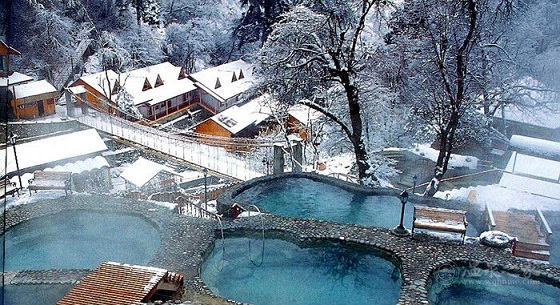By Tom McGregor, CNTV Commentator and editor
As more expatriates are living, studying and working in China, there’s a rising interest for foreigners here to search for a better understanding of the nation’s unique culture, customs and history.
The allure of ancient China can be highlighted by its colorful artworks, music and theater performances. But there’s more to it’s rich history, such as the prevalent hot springs bath culture, which remains popular in current Chinese society.

In July 1982, China’s 1st National Geothermal Conference was held, geologists identified over 2,600 hot springs in the country. A hot spring is defined - geo-thermally heated natural spring with water temperature at least 5 degrees Celsius (10 degrees Fahrenheit) above the surrounding outside air temperature.
Heated by rocks that come from inside the Earth’s crust, the water is rich in minerals, including carbonate, calcium, sulfur, vitriol and chloride.
Curative impact
Many Chinese, especially the elderly, prefer frequent hot springs, believing the waters can treat numerous ailments. They swear by its therapeutic powers.

Traditional Chinese Medicine (TCM) doctors have also detailed its healing impact, with therapeutic effects on various diseases - skin diseases, rheumatoid arthritis, gout and anemia.
Some women seek beauty treatment at spas to make their skin softer, face look younger and cleanse their body of harmful dioxins.
Other hot spring supporters claim some special waters can successfully treat gastro-intestinal, heart and gynecological diseases, as well as hypertension.
Well, hot springs do not serve as one stop cures for life-threatening illnesses, but most visitors can attest that they feel more relaxed and refreshed after an excursion there.
The communal aspect can reinvigorate mental well-being for some, where people gather with families, friends and strangers to talk, laugh and express their innermost feelings.
Different spas for different people
Another special characteristic of Chinese hot springs revolve around the differences of water minerals, temperatures and natural scenery for each spa. The hot springs found in Guangzhou are in dramatic contrast to Northeast China’s spas.
China is a large country with a vast and varied landscape. While there’s a blizzard blowing in Harbin, Liaoning Province, the tropical island province of Hainan could be basking in hot sunny weather.

Hot springs in different regions not only look different, but visitors have contrasting reasons for going. People in northern China and those residing in the mountains are more likely to go to hot springs in the winter to enjoy its warmth.
Those in southern China visit hot springs at all seasons, since the climate is warmer, and the trips are more for family affairs and social occasions.
Hot spring hot spots
China travel and tourism Websites tout a number of Chinese hot springs as very popular and trendy. They include:
Huaqing Hot Springs in Xi’an - recognized as the first spa in China, 2-3 million years old and with a constant water temperature at 43 degrees Celsius (109 degrees Fahrenheit). The location was favored by Emperor Xuanzong of the Tang Dynasty and his concubine, Yang Yuhuan.

Yellow Mountain (Huangshang) Hot Springs have a constant water temperature at 42 degrees Celsius and the waters are extra hydro-carbonated, known for its clearness and curing diseases.

Trumpet Shell Valley (Hailuogou) Hot Springs in Sichuan Province could lay claim to offering the most stunning natural scenery. Large mountains and glaciers stand in the backdrop.

A number of hot springs in and around Beijing and Guangzhou continue to be widely popular. People living in those cities live in congested neighborhoods and are looking to escape the daily stresses of life with an excursion to a local spa.
Hot times ahead
Many Chinese love to visit hot springs, but some expats remain reluctant to relax there. The communal atmosphere can intimidate visitors, especially Westerners, who value privacy more.
It can be uncomfortable to delve into steaming hot waters, which may feel like your skin and body are burning. Some pools are too small and with many people sitting in them.
Perhaps, Chinese hot springs baths can develop services that would be more appealing to foreign customers as well. If so, they could generate more substantial income by welcoming both Chinese and expat clientele.
( The opinions expressed here do not necessarily reflect the opinions of Panview or CCTV.com. )

Panview offers a new window of understanding the world as well as China through the views, opinions, and analysis of experts. We also welcome outside submissions, so feel free to send in your own editorials to "globalopinion@vip.cntv.cn" for consideration.















